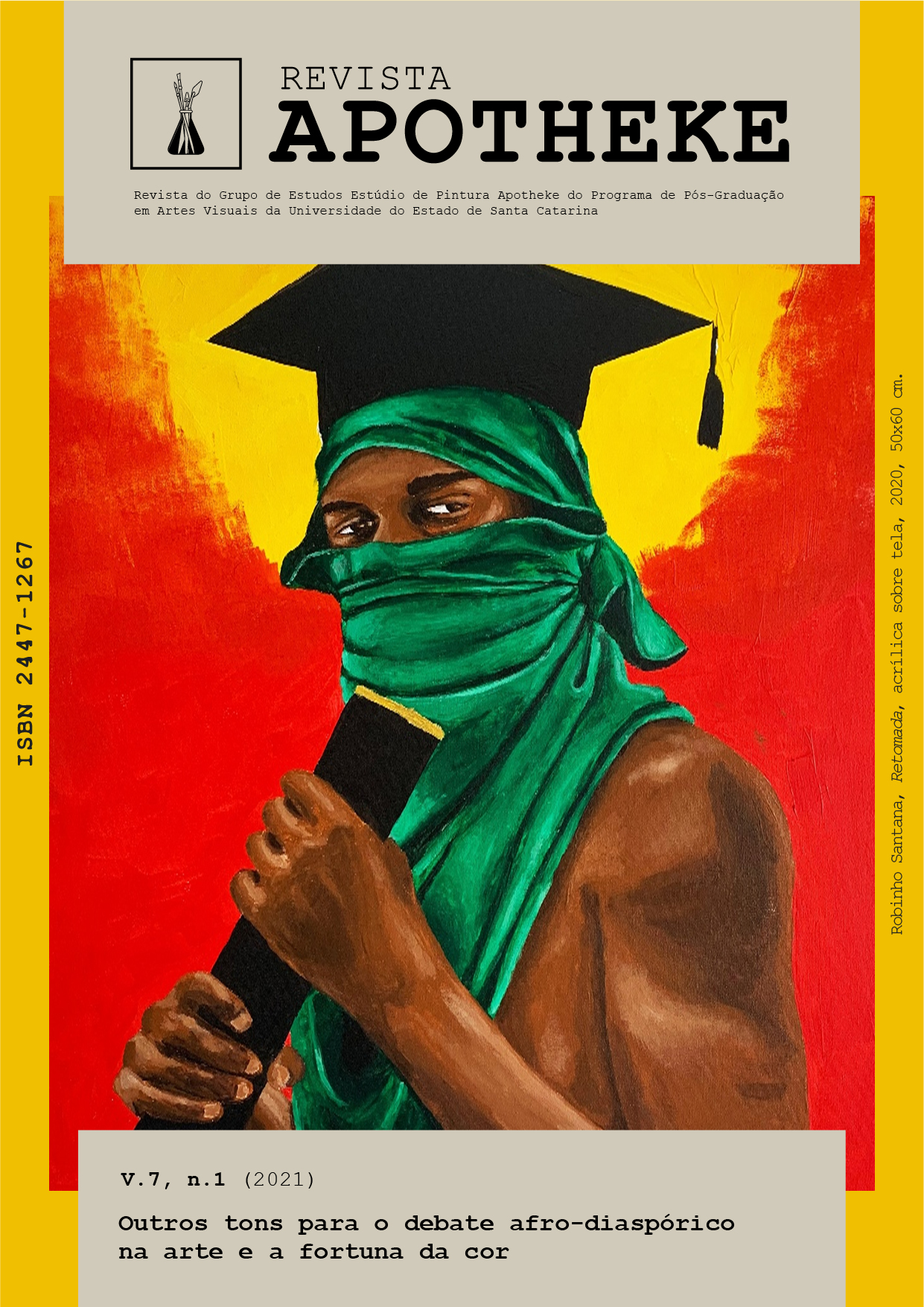Nego Fugido
DOI:
https://doi.org/10.5965/24471267712021115Palavras-chave:
Nego Fugido, Manifestação cultural popular, Memórias, Processo criativo, Artes VisuaisResumo
Esse texto investiga a manifestação cultural popular do Nego Fugido, suas relações com a história do Brasil e de que maneira afeta a comunidade pesqueira de Acupe, estado da Bahia, local onde é realizado o evento. Apresentamos uma descrição do evento, seus elementos simbólicos, como se destacam nas indumentárias das personagens, os processos que envolvem esse movimento na narrativa em si e que se mesclam nos causos e relatos dos moradores. A partir da experiência vivenciada no evento, foram realizados registros e esboços em desenho, durante e após a apresentação que se desmembraram em produções artísticas que refletem a expressividade do evento. São tecidas reflexões acerca dos conceitos de identidade e tradição que permeiam o movimento, assim como os fatores de vigilância e relações de poder presentes nos personagens. Aponta o papel da memória nas experiências vivenciadas que se tornam significativas ao longo da vida, servindo de molas propulsoras para o processo criativo no campo das Artes Visuais.
Downloads
Referências
ARUEIRA Expressões Brasileiras. Nego Fugido de Acupe - da Bahia para o Centro de São Paulo, São Paulo, Sesc São Paulo, 2018. Disponível em: https://www.youtube.com/watch?v=f2S6DiiVqhM. Acesso em 11 de Setembro, 2019.
BRITTO, Dalila. Nego Fugido: luta e resistência no Recôncavo da Bahia. Santo Amaro/BA: UFRB, 2019. Disponível em: https://www.youtube.com/watch?v=ylZoQ8Q_-sU. Acesso em 11 de Setembro, 2019.
DIAS, Belidson; IRWIN, Rita L. Pesquisa Educacional Baseada em Arte: A/r/tografia, Santa Maria, RS, Editora UFSM, 2013.
FOUCALT, Michel. Vigiar e Punir: o nascimento das prisões, Rio de Janeiro: Vozes, 2009.
HALL, Stuart. A Identidade Cultural na Pós-Modernidade. Tradução Tomaz Tadeu da Silva, Guacira Lopes Louro. 11 ed. Rio de Janeiro: DP&A, 2011.
HOBSBAWN, Eric; TERRENCE Ranger.et al. A Invenção das Tradições. Tradução de Celina Cardim Cavalcanti. Coleção Pensamento crítico; v. 55. Rio de Janeiro: Paz e terra, 1984.
JESUS, Camila Moreira. Branquitude x Branquidade: uma análise do ser branco, Recôncavo da Bahia, III Encontro Baiano de Estudos em Cultura, 2012.
PINTO, Monilson dos Santos. Nego Fugido: Teatro das Aparições. 2014. Dissertação (Mestrado em Artes Cênicas). Pontifícia Universidade Católica de São Paulo, 2014.
REIS, João José. Presença Negra: Conflitos e Encontros. In: COELHO, Magda Prates (Org.). Brasil: 500 anos de povoamento, IBGE, Centro de Documentação e Disseminação de Informações. Rio de Janeiro: IBGE, 2007, p. 79–100.
Downloads
Publicado
Como Citar
Edição
Seção
Licença
Copyright (c) 2021 Maria Betânia e Silva, João Vicente Annoni Albuquerque

Este trabalho está licenciado sob uma licença Creative Commons Attribution-NonCommercial 4.0 International License.
Os autores de trabalhos submetidos à Revista APOTHEKE autorizam sua publicação em meio físico e eletrônico, unicamente para fins acadêmicos, podendo ser reproduzidos desde que citada a fonte. Os mesmos, atestam sua originalidade, autoria e ineditismo.
Os artigos publicados pela revista são de uso gratuito, destinados a aplicações
acadêmicas e não comerciais. Os direitos autorais são todos cedidos à revista. Os artigos cujos autores são identificados representam a expressão do ponto de vista de seus autores e não a posição oficial da Revista Apotheke. O(s) autor(es) se compromete(m) a sempre que publicar material referente ao artigo publicado na Revista Apotheke mencionar a referida publicação da seguinte forma:
"Este artigo foi publicado originalmente pela revista Apotheke em seu volume (colocar o volume), número (colocar o número) no ano de (colocar o ano) e pode ser acessado em: http://www.revistas.udesc.br/index.php/APOTHEKE/index"
É responsabilidade dos autores a obtenção da permissão por escrito para usar em seus artigos materiais protegidos pela Lei de Direitos Autorais. A revista Apotheke não é responsável por quebras de direitos autorais feitas por seus colaboradores.
Os autores mantêm os direitos autorais e concedem à revista o direito de primeira publicação, com o trabalho licenciado sob Licença Creative Commons do tipo atribuição BY-NC:
Atribuição (BY): os licenciados têm o direito de copiar, distribuir, exibir e executar a obra e fazer trabalhos derivados dela, conquanto que deem créditos devidos ao autor ou licenciador, na maneira especificada por estes.
Uso Não comercial (NC): os licenciados podem copiar, distribuir, exibir e executar a obra e fazer trabalhos derivados dela, desde que sejam para fins não comerciais.
Após a publicação dos artigos, os autores permanecem com os direitos autorais e de republicação do texto.




